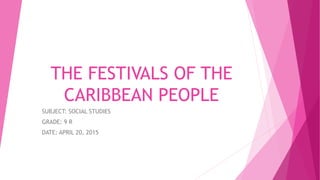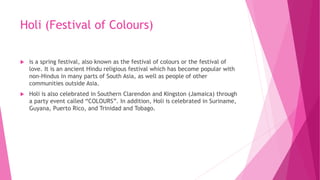Festivals of the caribbean people
- 1. THE FESTIVALS OF THE CARIBBEAN PEOPLE SUBJECT: SOCIAL STUDIES GRADE: 9 R DATE: APRIL 20, 2015
- 2. OBJECTIVES TO BE ACHIEVED AT THE END OF THIS LESSON: ’üĄ IDENTIFY THE MAIN RELIGIONS OF THE CARIBBEAN PEOPLE AFTER VIEWING A TABLE OF CONTRIBUTIONS ’üĄ NAME AND DESCRIBE THE MAJOR FESTIVALS THAT CARIBBEAN AFTER VIEWING PICTURES ’üĄ STATE ATLEAST FIVE REASONS THE PEOPLE OF THE CARIBBEAN CELEBRATE THESE SPECIFIC RELIGIONS AND FESTIVALS.
- 3. TABLE OF CONTRIBUTIONS FROM OUR ANCESTORS GROUP ORIGIN SYSTEMM OF LABOUR INFLUENCES Amerindian Indigenous To The Caribbean Communal society; cooperative communities ’éĘ Family ŌĆō communal living and ownership ’éĘ Craft ŌĆō basket weaving and ceramic pottery ’éĘ Food ŌĆō use of cassava, pepperpot, barbeque European England, France, Spain, Netherlands, Portugal Colonized the Caribbean the 17th century and brought other Europeans as indentured servants. ’éĘ Architecture ŌĆō great houses, plantations, fortifications ’éĘ Languages ŌĆō English, French, Spanish, Portuguese, Dutch ’éĘ Religion ŌĆō Christianity (Roman Catholic and Anglican church) ’éĘ Sports ŌĆō Cricket and Football ’éĘ Government ŌĆō parliament (Westminster model) and legal system ’éĘ Society ŌĆō family structures, clothing, courtship and marriage customs ’éĘ Education ŌĆō school systems and structure African West Africa Forced migration; worked as slaves in the Caribbean from the 17th century until emancipation in 1834 ’éĘ Traditional religions ŌĆō Vodun, Orisha, Spiritual Baptist ’éĘ Music ŌĆō use of the drum, dancing, tuk band: this influences most Caribbean musical forms ŌĆō calypso, reggae, cadence, zouk ’éĘ Language ŌĆō story telling, Anancy stories ’éĘ Food ŌĆō cou-cou, use of ground provisions ’éĘ Family patterns ŌĆō respect for elders, community living, central role of women ’éĘ Games ŌĆō warri, stick-licking ’éĘ Language ŌĆō dialects and Creole have many grammatical structures and intonations of the African language Asian India China Came as indentured workers from 1838 to 1917; recent migrants since 1950s Came as indentured workers in the 1850s; recent migrants since 1980s ’éĘ Religion ŌĆō Hinduism and Islam ’éĘ Festivals ŌĆō Hosei, Divali/Deepavali, Eid-al-Adha, Eid-al-Fitr ’éĘ Food ŌĆō roti, curry, doubles ’éĘ Music ŌĆō tassa tassa drum, chutney ’éĘ Language ŌĆō Hindi, Urdu ’éĘ New words in Caribbean English, e.g. roti ’éĘ Food ŌĆō chicken-in-the-rough, jerk chow mein ’éĘ Rice production
- 4. DESCRIBE WHAT YOU SEE
- 5. EID-UL-FITR ’āś Eid ul-Fitr is a three-day Islamic holiday that marks the end of Ramadan, the Islamic holy month of fasting. ’āś Eid ul-Fitr falls on the first day of Shawwal, the month which follows Ramadan in the Islamic calendar. Traditionally, the festival begins when the first sight of the new moon is seen in the sky. ’āś During the festival of Eid ul-Fitr, Muslims celebrate the end of fasting, and thank Allah for the help and strength given to them throughout the previous month. Muslims celebrate by gathering with friends and family, preparing sweet delicacies, wearing new clothes, giving each other gifts and putting up lights and other decorations in their homes. ’āś Celebrated in Trinidad and Tobago and Guyana
- 6. DESCRIBE WHAT YOU SEE
- 7. EID-UL-ADHA ’üĄ At the end of the Hajj (annual pilgrimage to Makkah), Muslims throughout the world celebrate the holiday of Eid al-Adha (Festival of Sacrifice). In 2015, Eid al-Adha will begin on or around September 23rd, and will last for three days. ’üĄ The Muslims sacrifice animals namely sheep and cows so as to commemorate Ibrahim (Abraham) following the command of AllahŌĆÖs (God) to sacrifice his son Ishmael (Issac). ’üĄ Mostly celebrated in Guyana
- 8. Describe what you see
- 9. Easter ’üĄ the most important and oldest festival of the Christian Church, celebrating the resurrection of Christ and held (in the Western Church) between 21 March and 25 April, on the first Sunday after the first full moon following the northern spring equinox. ’üĄ the weekend from Good Friday to Easter Monday.
- 10. Describe what you see
- 11. Christmas ’üĄ The Christians celebrate the Birth of their Saviour and the Son of God Jesus on the 25th of December. People usually spread good cheer and give gifts so as to signify the spirit of Giving because God sent His Only Son to earth to give men a way to salvation and forgiveness.
- 12. Describe what you see
- 13. Divali (Diwali) ’üĄ a Hindu festival with lights, held in the period October to November. It is particularly associated with Lakshmi, the goddess of prosperity, and marks the beginning of the financial year in India. ’üĄ Indians celebrate with family gatherings, glittering clay lamps, festive fireworks, strings of electric lights, bonfires, flowers, sharing of sweets, and worship to Lakshmi. Some believe that Lakshmi wanders the Earth looking for homes where she will be welcomed. People open their doors and windows and light lamps to invite Lakshmi in. ’üĄ Celebrated in Guyana and Trinidad, sometimes in Jamaica in Kingston (last time was on the lawn of Kings House courtesy of the Indian Ambassador)
- 14. Describe what you see
- 15. Holi (Festival of Colours) ’üĄ is a spring festival, also known as the festival of colours or the festival of love. It is an ancient Hindu religious festival which has become popular with non-Hindus in many parts of South Asia, as well as people of other communities outside Asia. ’üĄ Holi is also celebrated in Southern Clarendon and Kingston (Jamaica) through a party event called ŌĆ£COLOURSŌĆØ. In addition, Holi is celebrated in Suriname, Guyana, Puerto Rico, and Trinidad and Tobago.















